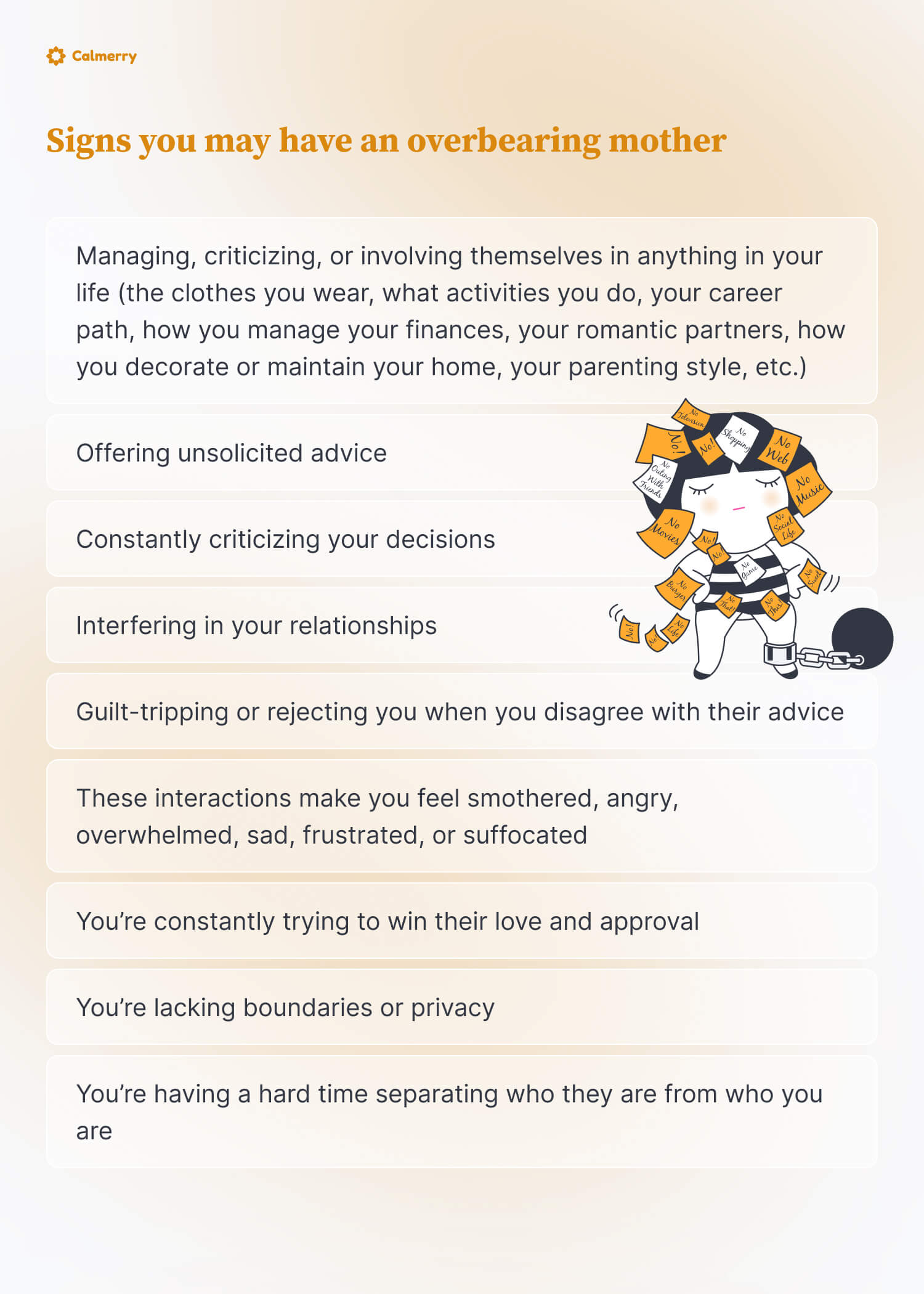Origins of a People Pleaser: Effects of an Overbearing Mother and How to Cope

In this article
The tale of Narcissus is a sad one.
A handsome young man, he fell in love with his own reflection and became consumed by it. The tragedy is, he never recognized that the reflection in the water was actually himself. He then died, never having developed real self-knowledge or truly knowing his own beauty and his own cruelty.
You might wonder what this has to do with overbearing mothers. It turns out that narcissism, whether it is a full-blown personality disorder or a nonclinical personality trait, can show up in parenting as an overbearing and engulfing presence.
What is an overbearing mother?
When you think of an overbearing mother, it might sound counterintuitive to think of narcissism. It’s commonly thought that people with narcissism are always totally focused on themselves.
In reality, there are many faces of maternal narcissism, one of which is termed the “engulfing” mom by psychologist Karyl McBride. [1] Kitzmillermedia. (2023). Home – Will I ever be good enough. Will I Ever Be Good Enough. https://willieverbegoodenough.com/
The overbearing or engulfing mother tends to insert herself in multiple aspects of your life. In doing so, she’ll often try to control or dominate what you do, how you act, and how you feel without space or attention for what you actually need or want.
To the outside observer, an engulfing or overbearing mother may appear to be a great mom – involved in your life and always seeming to be there to help you out. Others may perceive her as active and engaged. Your friends might even praise her.
This can make things more confusing when you find yourself feeling unworthy and invisible but also guilty for having these feelings when your mom is seemingly so involved in your life.
Signs of an overbearing mother
If your mom is like this described above, you might experience her managing, criticizing, or involving herself in anything from:
- The clothes you wear
- What activities you do
- Who you are friends with
- Your career path
- How you manage your finances
- Your romantic partners
- How you decorate or maintain your home
- Your parenting style
You also might find her:
- Offering unsolicited advice
- Constantly criticizing your decisions
- Interfering in your relationships
- Guilt-tripping or rejecting you when you disagree with her advice
These types of behaviors are sometimes referred to as “helicopter parenting” because the parent hovers over everything the child does.
But even more than what exactly your mom does, it’s important to notice how these interactions make you feel.
Whether it’s:
- Smothered
- Angry
- Overwhelmed
- Sad
- Frustrated
- Suffocated

Effects of an overbearing mother
Rather than tuning into your inner world, an engulfing mother will create her own sense of how you should be, which is not reflective of who you really are.
Therefore, children of overbearing mothers are often not given the room they need to find their own voices and grow into their unique selves.
People-pleasing
When your natural talents and desires are not nurtured, it’s easy to lose track of who you are. For this reason, many children of engulfing and controlling mothers find themselves conforming to who they think other people want them to be.
Along with this people-pleasing tendency often also comes an emotional void and deeply held insecurities.
When it comes to relating to your mother, you may notice:
- Constantly trying to win her love and approval
- Prioritizing how things seem to her rather than how they feel to you
- Taking on her anger or sadness
- Feeling judged and criticized
- Lacking boundaries or privacy
- Having a hard time separating who she is from who you are
In general, you may continue to struggle with feelings of:
- Being undeserving of love and nurturance
- Self-criticism
- Inadequacy
- Emptiness
- Invisibility
And beliefs that:
- Your value lies in what you do rather than who you are
- How you look is more important than how you feel
- Validation comes from others rather than from within
Personality traits
When you never learned to experience and process your feelings, they’ll likely come out in hidden ways.
You may find yourself constantly trying to prove your worth through your accomplishments. But no matter how much you do, you still feel inadequate.
Alternatively, you may numb your pain with food or alcohol to divert your attention from these early wounds.
Romantic relationships
It’s all too common for children of overbearing parents to try to fill their sense of emptiness through a love relationship.
The problem is, in seeking a romantic partner to validate you, you might find yourself in codependent relationships that center too much around you taking care of them or subordinating yourself to them.
– Kate Dubé, Licensed Clinical Social Worker (LCSW)
You may also find that you choose romantic partners who are not able to meet your emotional needs. And while your gut instinct will likely tell you that something is not quite right, you’ll also find yourself attracted to the familiar pattern of constantly grasping for something out of reach.
This “repetition compulsion” to recreate the dynamic you have with your mother may drive you to choose partners again and again who can’t connect with you in an emotionally vulnerable way.
A note on effects of controlling mothers on daughters
While maternal narcissism can impact children of any sex or gender identity, daughters are often seen as a reflection and extension of their mother.
While a daughter may try hard to develop a genuine connection with her overbearing mom, she may also learn that she needs to mold herself into the figure that others want her to be in order to be accepted and loved.
How to deal with an overbearing mother
It’s natural to want to live your own life. Yet, when you are under constant pressure to act in the world as an extension of your mother, it’s easy to lose track of yourself.
Below are six ways to reconnect with yourself and live in alignment with what matters to you.
1. Grieve the mother you didn’t have
Everyone deserves a mother who accepts and nurtures them. If you did not have this, you have every right to grieve the loss.
To do this, it can be helpful to write down the qualities of the mother you wish you had. Allow feelings of disappointment and pain to emerge – knowing that in facing this sadness, you are able to move through it rather than have it eat away at you.
Keep an eye out for guilt as you go through this grieving process. You might notice yourself saying that it could have been worse, it wasn’t that bad, or your mother tried her best.
All of those things might be true, and you can still feel sad and disappointed.
2. Practice compassion
It can be helpful to practice seeing your mother as a complicated human with her own insecurities, hopes, and suffering. This doesn’t mean that you have to accept the ways that she treated or continues to treat you or even that you have to continue in an unhealthy relationship with her.
Instead, this exercise of compassion is all about your development and capacity to love and be loved by others in a deeper and more complete way.
3. Develop your sense of self
Becoming a whole and authentic person is a lifelong pursuit. An early step in this process involves separating from your mother so that you can develop your own inner life. This means having your own needs, feelings, and desires.
When you’re in an enmeshed relationship with your mother, your sense of self may feel vague or distant. And your life may currently revolve around meeting her or other’s expectations or needs rather than being who you are.
In Karyl McBride’s wonderful book, Will I Ever Be Good Enough?, she explains that this process of individuating and coming into your own involves the ability to:
- Experience and express a wide range of feelings in healthy ways
- Comfort and soothe yourself when difficult feelings arise
- Give yourself credit where credit is due
- Identify and go after what you want and hope for
- Believe that you are worthy
- Make decisions and stick to your commitments
- Express yourself fully and honestly in your close relationships
- Find meaning within and in your own company
- Maintain a solid inner core that doesn’t waver among life’s highs and lows
4. Call upon your internal mother
We all have a maternal instinct capable of offering nurturance and love to ourselves. Dr. McBride calls this our internal mother.
To access her, start by writing a list of the things that you value about yourself. It may be your wisdom, creativity, spirituality, or something completely else.
As you sift through the different voices within, you may notice your inner critic getting louder. See if you can also hear that kind, gentle, and understanding voice within, even if it’s just a whisper. That voice is your inner mother.
And as you practice listening to her, she will grow louder and stronger.
5. Set boundaries
While the bulk of coping with the effects of an engulfing mother occurs internally, there is still the issue of how to interact with your actual mother. You may find yourself struggling to set boundaries out of fear that you’ll make her upset and ultimately be abandoned.
Likely, you struggle to set limits with other important people in your life, too.
Being capable of knowing and asserting your limits often takes some getting used to. Yet, as you get more practiced, you’ll find yourself comforted in knowing that by doing this, you are actually no longer abandoning yourself or your needs.
6. Try therapy
You may choose to work through all of these processes with a therapist who can help guide and support you.
Whether it’s in person or online therapy, you can develop a plan with your therapist to work on emotional maturity and:
- Recognizing and becoming accountable to your own feelings
- Having the courage to express your needs and desires
- Homing in on your values and what matters most to you
- Building healthy empathy for other people’s experiences
A word from Calmerry
Starting your journey of self-discovery and healing, especially when navigating through the effects of an overbearing or controlling mother, can be very rewarding yet challenging.
When you feel ready, our licensed and experienced therapists are here to support you through video and text sessions.
They can provide guidance on:
- Helping you understand and get in touch with your emotions and values
- Coping with stress and improving your relationship with your mother
- Expressing yourself assertively and setting healthy boundaries
- Boosting your self-esteem and confidence, helping you to live life on your own terms
- Exploring your past experiences and patterns in a relationship and how they impact your present
Start with a brief survey – and we will match you with a professional who understands your unique needs within 1 hour.
Kitzmillermedia. (2023). Home – Will I ever be good enough. Will I Ever Be Good Enough. https://willieverbegoodenough.com/
online therapy
live video session



